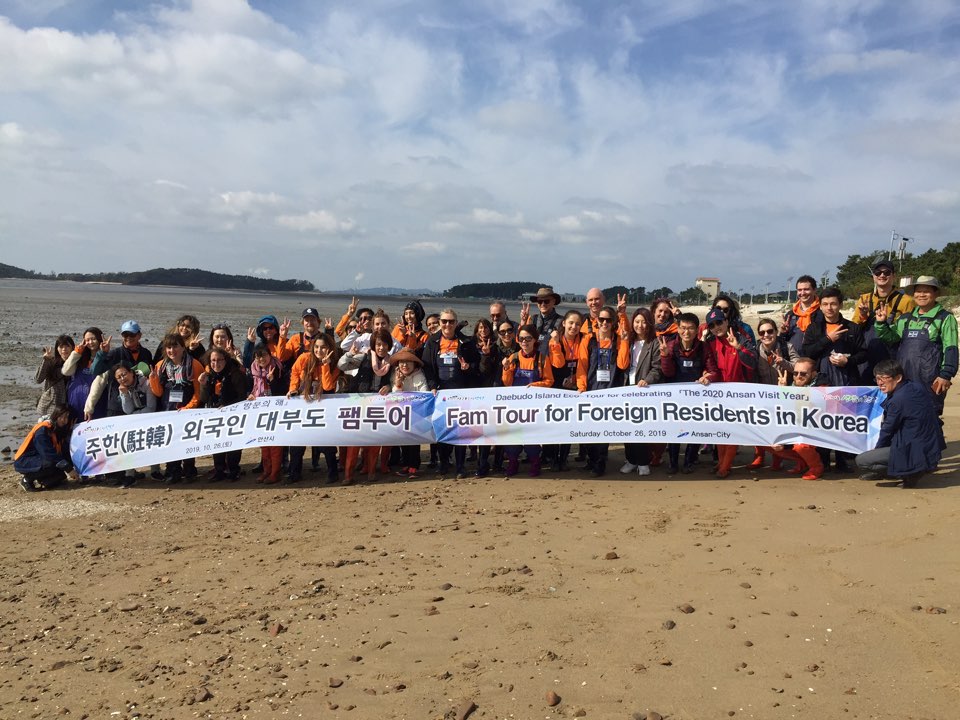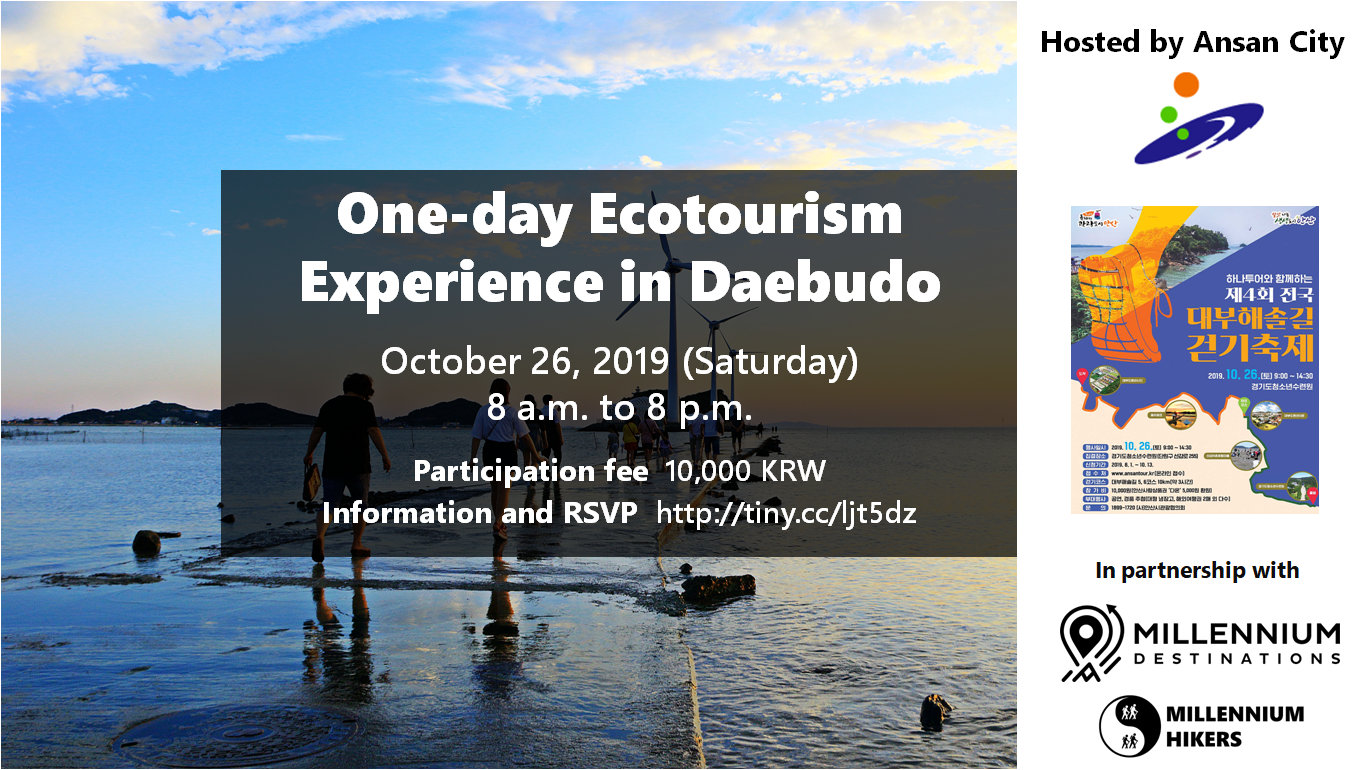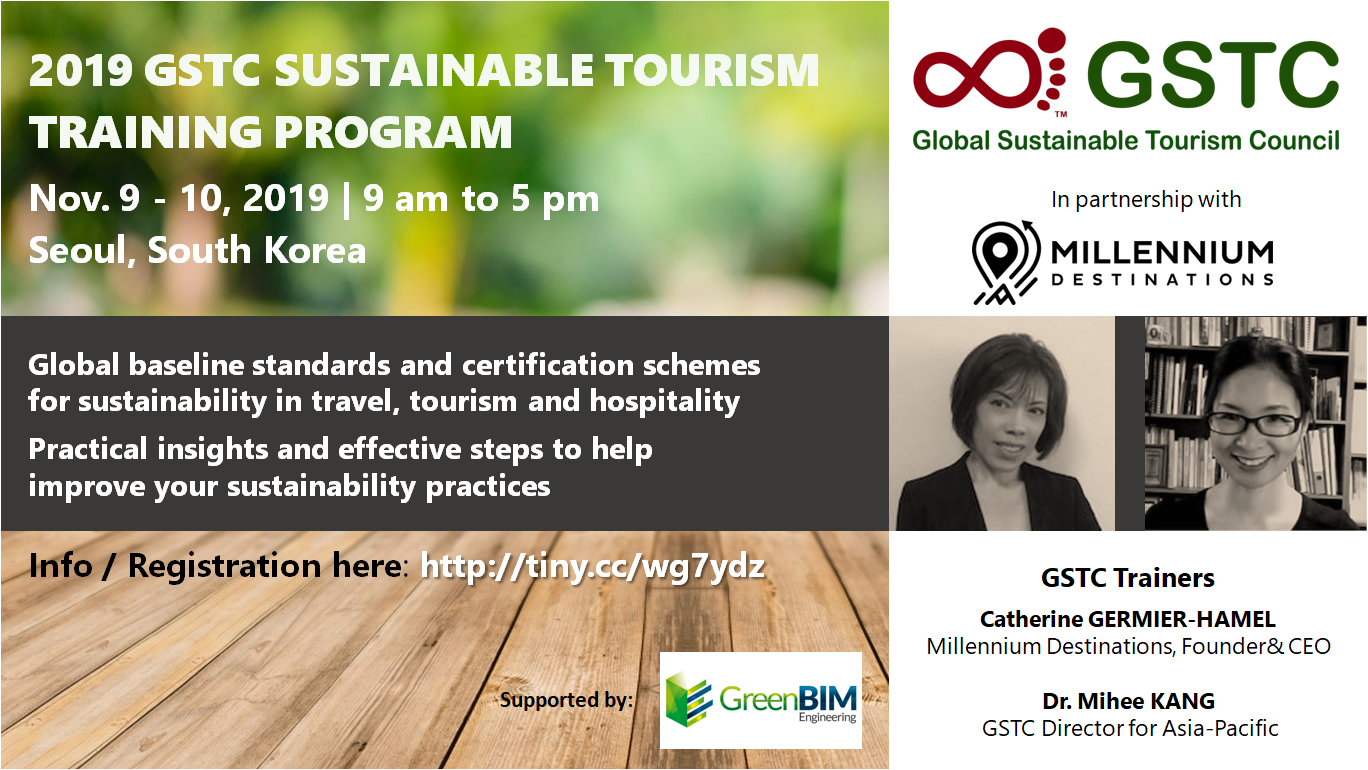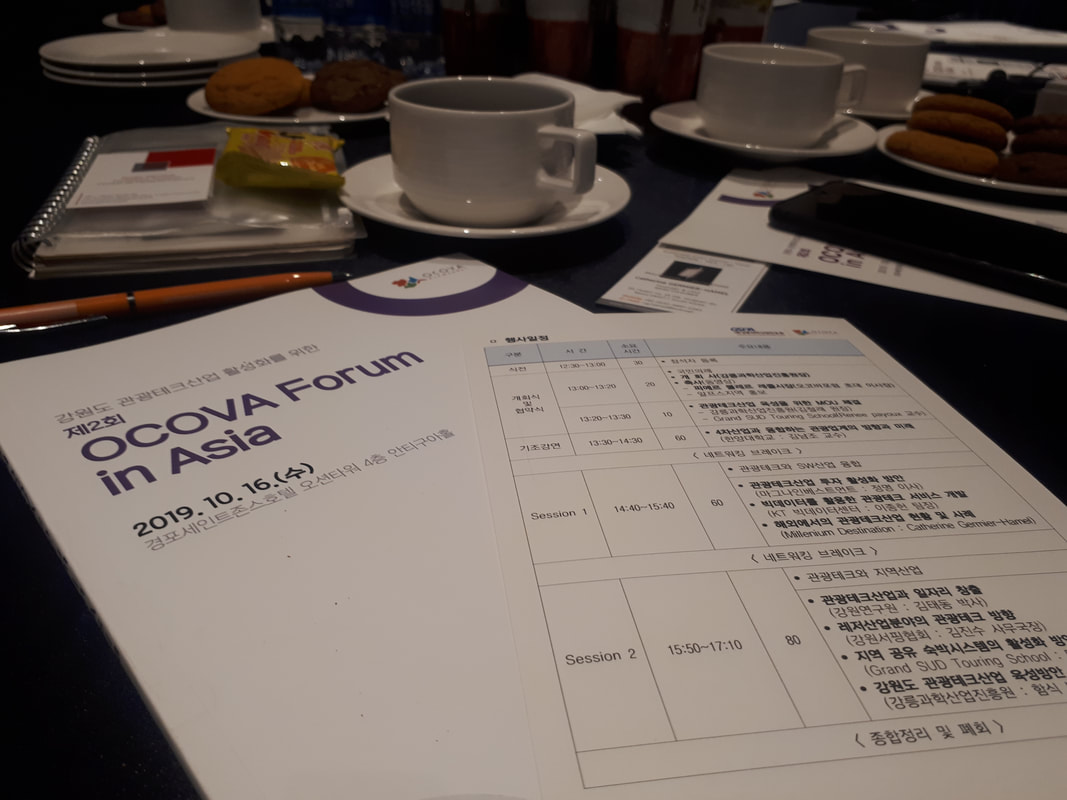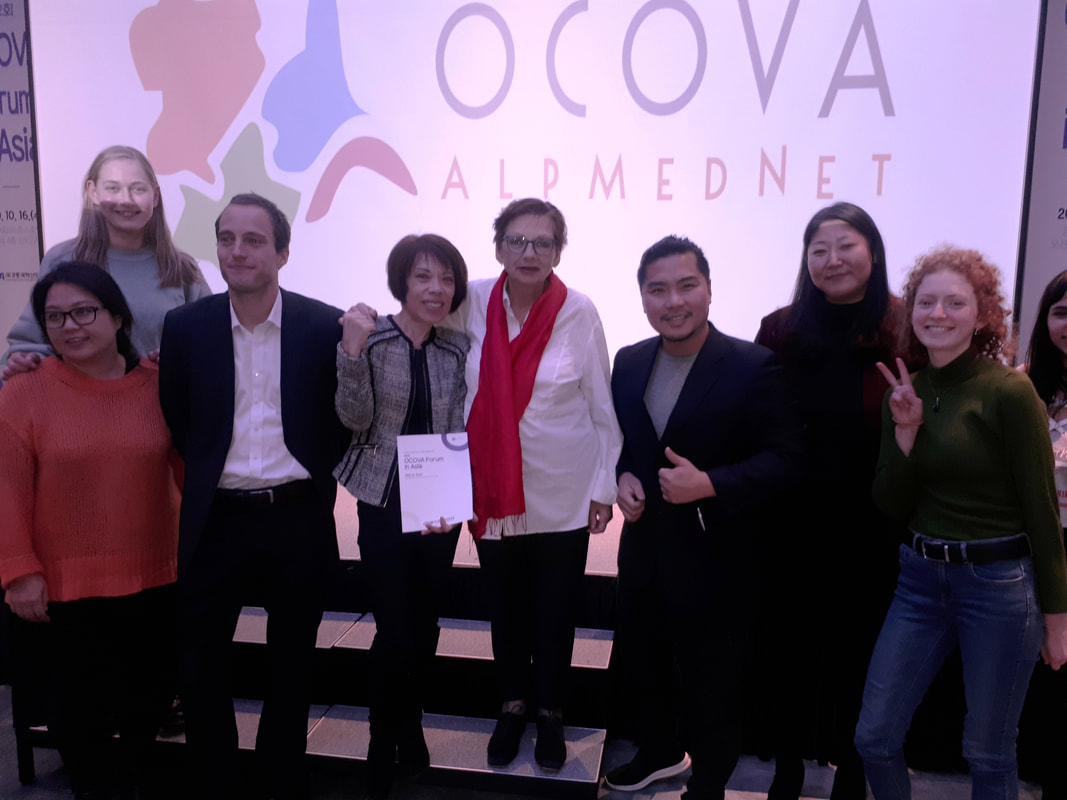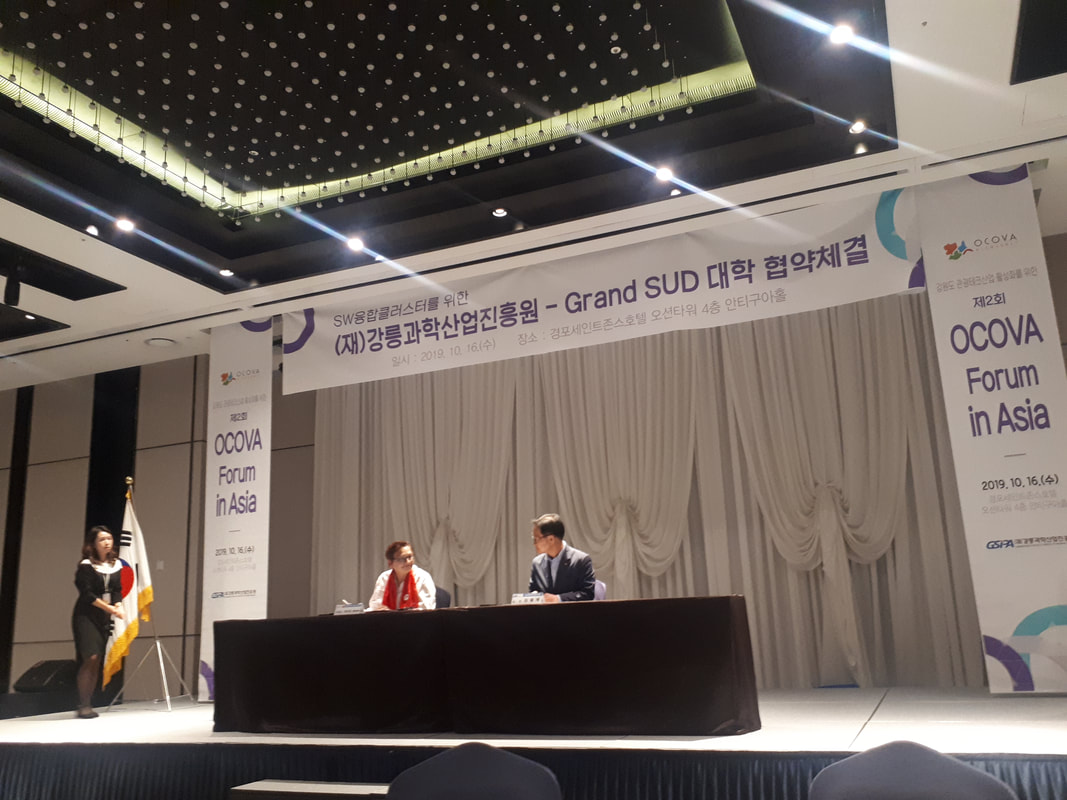|
As part of its efforts to promote ecotourism in Daebu island, Ansan city organized a fam tour for foreign residents in Korea on Oct. 26, 2019. It can be sometimes challenging to promote a fragile and vulnerable ecosystem such as an island, when the least thing you want is to see it become a mass tourism destination. Nonetheless, sustainable tourism is definitely a powerful tool for local development and community empowerment, and a smart marketing strategy can help target and attract the right people: those who care and are equipped to co-create a sustainable, fair and responsible experiences with the locals. Within the framework of its project to develop ecotourism in Daebudo (Daebu island), the tourism department of Ansan city, South Korea, organized a fam tour (familiarization tour) for foreign residents in South Korea on Oct. 26, 2019. Millennium Hikers, the international community of walkers and hikers founded by Millennium Destinations was invited to part of it. Once called “the Hawaii of Ansan” and now dubbed “the Treasure Island”, Daebudo has been praised for its beautiful landscapes and has kept the appeal and characteristics of an island even if it is now linked to the Ansan mainland through the Sihwa seawall. With several thousand visitors per day day during peak season, Daebudo has indeed become a popular destination for Koreans, and particularly families or anyone looking for a beautiful, quiet and exotic escape. Many people, and particularly photographers, visit Daebudo and surrounding islands as top spots to watch the sunset. On the other hand, most visits to Daebudo usually do not last more than one day and the island does not seem to attract many foreign tourists or foreigners living in Korea, if we refer to the number of mentions on the Internet and in social networks. Moreover, Daebudo has not been promoted as strongly as Ansan and/or is not perceived as an ecotourism or nature-based destination, even if Daebudo and Daesong wetland in Ansan have been designated as eco-tour zones by the Korean Ministry of Environment in 2014, together with Sanmakyi old trail and Lake Goesan in Goesan, Gasiyeon wetland and Lake Gyeongpo in Gangneung, Hyodon stream and Haryeli village in Seogwipo and Gochang dolmen. According to researches, ecotourism is still considered a niche market but it has developed steadily over the past years. The market demand for ecotourism has been largely centered in the western world, mostly English-speaking countries, but more and more ecotourists are now coming from other regions such as the Asian Tigers.
For many ecotourists, the main motivation is the inherent quality of the landscape and wildlife of the destination, together with the opportunity to meet local people and experience cultural traditions and lifestyles. Many of them like to take photos and are even professional photographers. This is the case for more and more birdwatchers. Some ecotourists are looking for complementary activities such as hiking, cycling, etc. In South Korea, outdoor and leisure / leports (leisure and sports) activities have become more and more popular. There are over 15 million regular hikers in South Korea and biking / cycling has developed recently. In general, a growing public interest in ecotourism has been reported in Korea. Regarding Daebudo, it seems that tourism marketing efforts have been more focused on domestic visitors, and short term visits. Due to its characteristics, the island may compete with similar ecotourism destinations, in Korea or not, that are better known and/or or promoted, such as Suncheon Bay, which has become a renowned ecological tourism destination even among foreigners. Having said that, competition may become an opportunity if synergies and partnership can be created with those similar destinations. The Ecotour in Daebu island designed by Ansan city included the following experiences:
Millennium Destinations provided its support to the project for the marketing and communication strategy and through arranging a diverse group of around 40 "Millennium Hikers", expats living in Korea and Koreans from different backgrounds (diplomats, professionals, professors, consultants, students, social media influencers, etc. ). According to the results of the post-tour survey, all participants have been either very satisfied or satisfied with their experience in Daebu island, mudflat walking and interacting with the locals being their favorite activities. Conversely, foreign participants expressed their need for more information and interpretation in English (at least). In any case, Ecotourism products in Daebudo should focus on protected areas as focal points. They should also intend to include experiences and activities that would contribute to reduce overcrowding and seasonality. Promotion activities should consider the carrying capacity of the island and should be carried out in concertation with the local residents.
1 Comment
Sustainable tourism may have become popular over the past years but what do we really know about it, and how to best achieve it?
If you want to be familiar with sustainable tourism and become an informed practitioner, join our upcoming 2019 GSTC Sustainable Tourism Training in Seoul! This two-day training class is designed for travel, tourism and hospitality professionals interested in learning about sustainability good practices for businesses and destinations. Through this interactive leaning journey you will gain an in-depth understanding of the GSTC Criteria as the global baseline standards for sustainability in travel and tourism, the roles of accreditation and certification in advancing the sustainability agenda in the tourism industry, as well as topics such as global trends in sustainable tourism, sustainability marketing, and sustainable tourism product development and management. Trainers: Ms. Catherine GERMIER-HAMEL, Millennium Destinations, Founder & CEO Dr. Mihee KANG, GSTC, Director for Asia-Pacific Hosted in partnership with Millennium Destinations, with the support of GreenBIM Engineering. Information and registration here. The Global Sustainable Tourism Council (GSTC) is managing the GSTC Criteria, the global baseline standards for sustainable travel and tourism; as well as acting as the international accreditation body for sustainable tourism certification. By Catherine GERMIER-HAMEL
Whereas France has been recently re-branded as a "startup nation", is there anything innovative, new and/or smart France can be proud of in the field of travel and tourism? And the answer is: absolutely (yes, I'm French)! At least, this is what I intended to highlight during the 2nd OCOVA Forum in Asia hosted by the GSIPA - Gangneung Science & Industry Promotion Agency, on Oct. 16, 2019, under the theme of Tourism and the 4th Industrial Revolution. In my presentation, I introduced French innovative inititiaves towards smart sustainable tourism, including France Tourisme Lab, the national network of incubators and accelerators in tourism, and tech for good initiatives that can be applied to tourism sectors. As of today, 7 structures are part of France City Lab:
During the Forum, a partnership agreement was signed between GSIPA and Grand Sud Formation, a tourism high school based in Toulouse, France. The Forum OCOVA has been organized annually since 2004 in Les Orres, a French ski resort located in the Hautes-Alpes department in Provence-Alpes-Côte d'Azur region. It has been providing a venue for networking and knowledge exchange on smart technologies and innovation, particularly in mountain areas. The Asian edition of the OCOVA Forum was launched in 2018 in Gangneung, South-Korea. |
Archives
February 2024
|
|
France - Cambodia
|
|
Promoting Positive Places, Practices and Experiences
|
Icons by Freepik from www.flaticon.com
|

